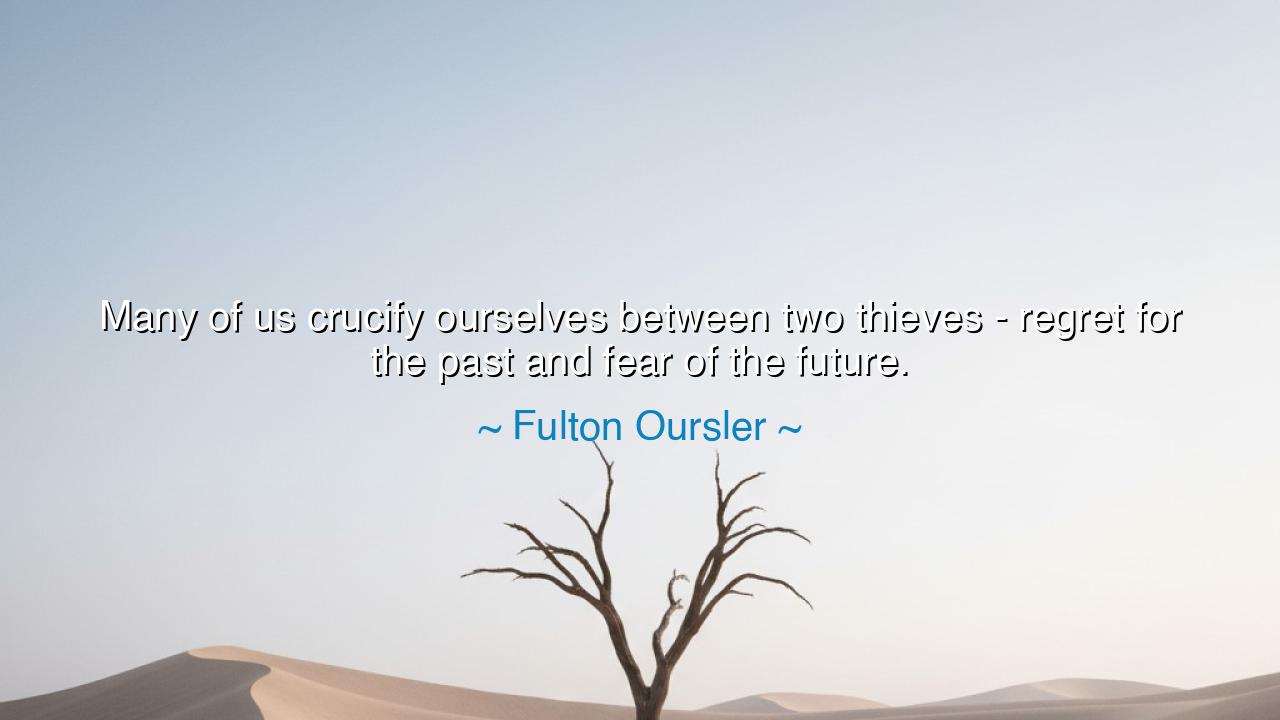
Many of us crucify ourselves between two thieves - regret for the
Many of us crucify ourselves between two thieves - regret for the past and fear of the future.






In the grand tapestry of life, there is a timeless struggle that has faced every soul that has ever walked this earth. It is a battle that comes not from without, but from within. The wise Fulton Oursler, in his words, "Many of us crucify ourselves between two thieves - regret for the past and fear of the future," speaks to a universal tragedy that holds us captive in its vice. For what is regret but the relentless pain of actions we cannot undo, the missed opportunities we wish to revisit? And what is fear but the shadow of what may come, the uncertainties that twist our hearts with anxiety? Both of these thieves, ancient and powerful, steal from us the gift of living fully in the present.
Let us reflect upon the ancient teachings of those who understood the weight of the past and the future. The great philosophers of old, such as Socrates and Epictetus, often spoke of the importance of focusing on the present moment, for it is in the present that we hold the power to shape our destiny. Regret chains us to what we cannot change, while fear binds us to a future that has yet to unfold. And in this struggle between what was and what might be, we often lose sight of what is—the only moment we truly possess. Oursler’s words call upon us to awaken from this trance, to rise above the burdens of regret and fear, and to embrace the strength that lies in living with clarity and intention.
Consider, too, the tale of Achilles, the greatest of Greek heroes. Though he was a mighty warrior, his life was ruled by both regret and fear. Regret for the death of his friend Patroclus, and fear of his own inevitable demise. His life, torn between these two forces, led him to his tragic end. In the battle of his mind, he was unable to break free from the grip of these twin thieves. The Greeks believed that one could not truly achieve greatness unless they mastered inner peace, and yet Achilles, despite his strength, could not free himself from the weight of past and future. This ancient story illustrates how regret and fear can overpower even the most valiant of souls, leading to destruction when not conquered.
It is a story echoed in every age. For the ancients, the key to true strength lay in the art of letting go. The great warriors and thinkers knew that to be at peace, one must release the burdens of what cannot be changed and surrender the illusion of control over what lies ahead. Buddha spoke of this in his teachings, reminding us that desire for the future and attachment to the past are the roots of suffering. It is not the future itself that troubles us, nor is it the past, but our constant attachment to them. Fulton Oursler’s words echo these ancient truths, urging us to find release, to unshackle ourselves from the thieves of regret and fear.
In the face of these two thieves, we must recognize the true enemy—not the past, not the future, but our inability to be present. If we are to take action, we must first recognize that the present is all we have. It is the moment that holds the key to our freedom. The ancient teachings call us to surrender the past, to forgive ourselves for what has passed, and to trust that the future will unfold as it will, in due time. The life of a great sage, such as Confucius, reminds us that we should act today with wisdom, for today is the day we can shape. To waste it on thoughts of past and future is to waste the opportunity of living well.
So, what is the lesson for us, the descendants of those who have walked this path before? Let us release the past—not to forget it, but to accept it, learn from it, and move forward without its weight. Let us face the future not with fear, but with courage, trusting that we have the strength to meet it. And most importantly, let us be present in this moment, for it is in this moment that we are most alive. Just as the ancient philosophers taught, the key to peace lies not in conquering external forces, but in mastering ourselves, in freeing ourselves from the chains of regret and fear, and in embracing the fullness of life as it is.






AAdministratorAdministrator
Welcome, honored guests. Please leave a comment, we will respond soon